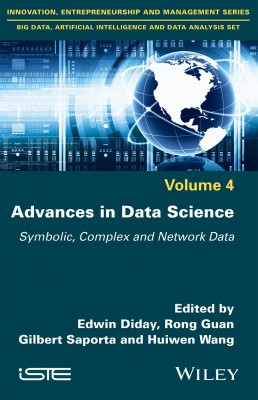
Edited by
Edwin Diday, Paris-Dauphine University-PSL, France
Rong Guan, Central University of Finance and Economics, China
Gilbert Saporta, Conservatoire National des Arts et Métiers, France
Huiwen Wang, Beihang University, China
Data science unifies statistics, data analysis and machine learning to achieve a better understanding of the masses of data which are produced today, and to improve prediction. Special kinds of data (symbolic, network, complex, compositional) are increasingly frequent in data science. These data require specific methodologies, but there is a lack of reference work in this field.
Advances in Data Science fills this gap. It presents a collection of up-to-date contributions by eminent scholars following two international workshops held in Beijing and Paris. The 10 chapters are organized into four parts: Symbolic Data, Complex Data, Network Data and Clustering. They include fundamental contributions, as well as applications to several domains, including business and the social sciences.
Part 1. Symbolic Data
1. Explanatory Tools for Machine Learning in the Symbolic Data Analysis Framework, Edwin Diday.
2. Likelihood in the Symbolic Context, Richard Emilion and Edwin Diday.
3. Dimension Reduction and Visualization of Symbolic Interval-Valued Data Using Sliced Inverse Regression, Han-Ming Wu, Chiun-How Kao and Chun-houh Chen.
4. On the “Complexity” of Social Reality. Some Reflections About the Use of Symbolic Data Analysis in Social Sciences, Frédéric Lebaron.
Part 2. Complex Data
5. A Spatial Dependence Measure and Prediction of Georeferenced Data Streams Summarized by Histograms, Rosanna Verde and
Antonio Balzanella.
6. Incremental Calculation Framework for Complex Data, Huiwen Wang, Yuan Wei and Siyang Wang.
Part 3. Network Data
7. Recommender Systems and Attributed Networks, Françoise Fogelman-Soulié, Lanxiang Mei, Jianyu Zhang, Yiming Li, Wen Ge, Yinglan Li and Qiaofei Ye.
8. Attributed Networks Partitioning Based on Modularity Optimization, David Combe, Christine Largeron, Baptiste Jeudy,
Françoise Fogelman-Soulié and Jing Wang.
Part 4. Clustering
9. A Novel Clustering Method with Automatic Weighting of Tables and Variables, Rodrigo C. De Araújo, Francisco De Assis Tenorio De Carvalho and Yves Lechevallier.
10. Clustering and Generalized ANOVA for Symbolic Data Constructed from Open Data, Simona Korenjak-Cerne, Natasa Kejzar and
Vladimir Batagelj.
Edwin Diday is Emeritus Professor at Paris-Dauphine University-PSL. He helped to introduce the symbolic data analysis paradigm and the dynamic clustering method (opening the path to local models), as well as pyramidal clustering for spatial representation of overlapping clusters.
Rong Guan is Associate Professor at the School of Statistics and Mathematics, Central University of Finance and Economics, Beijing. Her research covers complex and symbolic data analysis and financial distress diagnosis.
Gilbert Saporta is Emeritus Professor at Conservatoire National des Arts et Métiers, France. His current research focuses on functional data analysis and clusterwise and sparse methods. He is Honorary President of the French Statistical Society.
Huiwen Wang is Professor at the School of Economics and Management, Beihang University, Beijing. Her research covers dimension reduction, PLS regression, symbolic data analysis, compositional data analysis, functional data analysis and statistical modeling methods for mixed data.